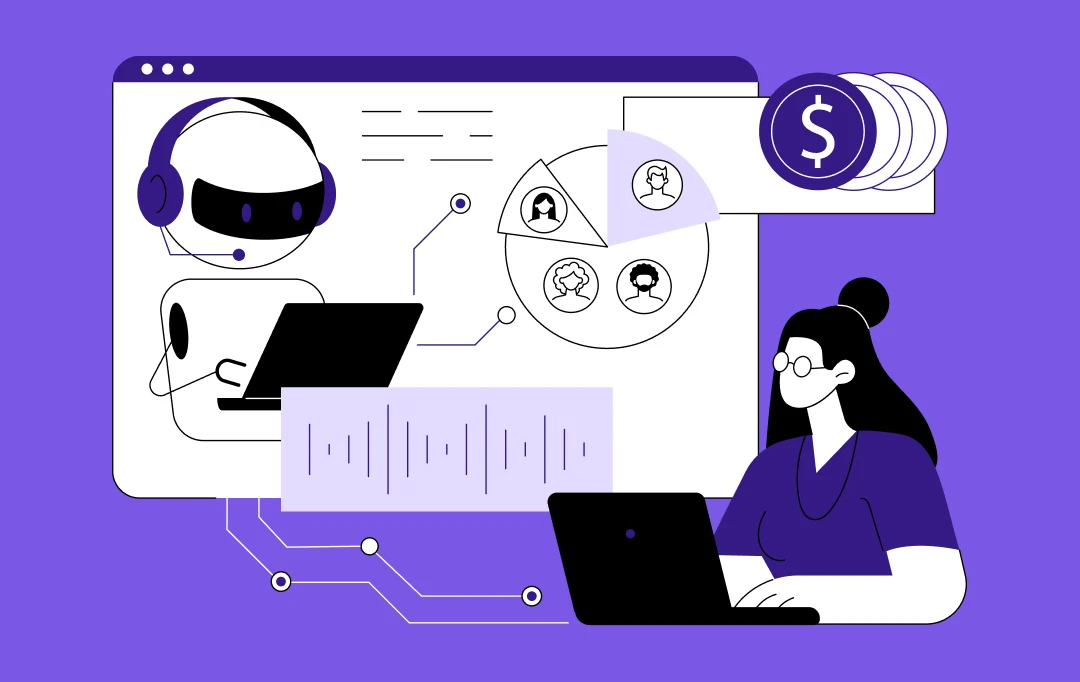- Understanding the AI Market: Why Invest in Custom AI Now?
- Challenges and Considerations in Custom AI Development
- Ask These Decision-Making Questions Before Investing in Custom AI for Your Business
- Ecosystem and Technology Infrastructure Readiness
- Strategic Vision and Business Alignment
- Ecosystem and Technology Infrastructure Readiness
- Data Governance and Ethics
- Investment Strategy and Financial Thought
- Risk Management and Long-Term Sustainability
- Business Impact of Custom AI
- Incident Response Plan
- Custom AI Model Development and Capabilities
- AI Performance and Optimization
- Vendor Reliability and Expertise
- Scalability and Future-Proofing With AI
- Why Choose Appinventiv for Custom AI Solutions?
- FAQs
Key takeaways:
- Businesses should ask how AI solutions align with their long-term goals and deliver measurable outcomes that address specific business needs, such as improving efficiency or personalizing CX.
- Before investing in custom AI, businesses must inquire about the costs of developing, implementing, and maintaining custom AI solutions, as well as projected ROI.
- It’s essential to assess the readiness of existing tech infrastructure to support AI integration without disruptions.
- AI solutions must adhere to ethical standards, mitigate biases, prioritize data security, and comply with relevant regulations (e.g., GDPR).
- Businesses must understand how AI solutions will be monitored, updated, and optimized over time. It’s equally important to choose a vendor that offers ongoing support and can adapt AI models to changing market conditions or evolving business goals.
Artificial Intelligence is the secret weapon for companies ready to stay competitive, improve efficiency, and deliver personalized customer experiences at scale. But while off-the-shelf AI solutions are easy to access, they often fall short of solving domain-specific challenges or adapting to your business logic.
This is where custom AI stands apart — engineered for your workflows, trained on your data, and designed to solve problems no generic model can.
From intelligent automation that streamlines operations to predictive models that read customers like an open book, custom AI for business is rewriting how brands compete, connect, and grow worldwide. But custom means complexity—and investment. From model architecture and training data to deployment environments and ROI timelines, there are layers of technical and strategic decisions to make.
The question isn’t whether custom AI development will create an impact but whether you’re asking the right questions before you implement it in your business.
In this blog, we’ll help you think beyond the hype and get clarity on what matters most:
- How do you define success for AI in your business?
- What kind of data readiness is required?
- Who will manage the lifecycle post-deployment?
- And most importantly, when is custom AI worth the investment?
Whether you’re a CTO evaluating technical feasibility, a founder mapping go-to-market priorities, or an enterprise leader shaping digital transformation, this guide will help you make informed, high-stakes decisions with confidence.
Understanding the AI Market: Why Invest in Custom AI Now?
The global AI market is entering its high-growth phase, expected to grow from $244.22 billion in 2025 to over $1 trillion by 2031 (Statista). But sheer market size isn’t the signal that matters most. What matters is timing, and right now, custom AI is where future-ready enterprises are placing their bets.

With the AI ecosystem now mature—from cloud infrastructure and model deployment to regulatory visibility—businesses have the opportunity to go beyond plug-and-play tools and build AI solutions that are fully aligned with their data, operations, and strategic goals.
This isn’t about adopting AI. It’s about owning your AI advantage before the market standardizes.
The Market Is Shifting from Generic to Tailored AI
Global research reflects a decisive pivot. According to Gartner, by 2027, over 50% of GenAI models deployed by enterprises will be custom-trained for domain-specific use. This shift isn’t just about better performance — it’s about overcoming structural limitations that off-the-shelf models can’t fix:
- Incompatibility with legacy tech stacks
- Limited ability to leverage proprietary datasets
- Compliance and privacy blind spots in regulated industries
Why Now?
- AI maturity is high: Cloud-native infrastructure, MLOps pipelines, and no-code AI tools have drastically reduced time-to-deploy.
- Your data is a strategic asset: Companies with years of operational data are training models that outperform any external solution.
- Compliance is becoming sector-specific: From finance and healthcare to logistics and education, building for regulation starts with building for context, and custom AI does exactly that.
Enterprise Use Cases Are Evolving
Custom AI is already driving high-ROI impact across industries:
- Predictive inventory planning in retail and logistics
- Hyper-personalized product recommendations in eCommerce
- Automated claims processing and fraud detection in insurance and fintech
- Risk profiling and audit workflows in healthcare and compliance
If your business relies on proprietary workflows, sensitive data, or complex decision-making, now is the moment to invest in AI that’s purpose-built, not repurposed.
Challenges and Considerations in Custom AI Development
Custom AI holds transformative potential — but without the right groundwork, that potential often stalls in execution.
Before jumping into model selection or development sprints, business leaders need to be aware of the operational realities that shape AI implementation. From infrastructure gaps to compliance risks, these are the real-world factors that can determine whether your AI solution drives value or becomes shelfware.
1. Data Readiness
Custom models need well-labeled, relevant datasets to perform. If your data is scattered across teams or locked in legacy systems, expect upfront time spent on cleaning, governance, and architecture.
2. Integration with Legacy Systems
To deliver impact, it must plug into CRMs, ERPs, or custom workflows. But if your infrastructure is fragmented or lacks modern APIs, integration delays are inevitable. Teams often underestimate the work needed to connect models to real-time systems.
3. Skilled Resources Are Critical
Custom AI development demands more than just data scientists. You need machine learning engineers, DevOps support, product owners, and security architects — all aligned. Many companies either struggle to staff these roles or over-rely on vendors without clear handoff strategies.
4. Model Performance Degrades Over Time
Even a great model won’t stay great forever. As business conditions evolve, data patterns shift, and performance dips. That’s why model monitoring, retraining, and ongoing evaluation are non-negotiable for long-term success. It’s not a one-time launch — it’s an operational capability.
5. Compliance and Trust Must Be Built-In
Whether you’re operating in healthcare, finance, or retail, compliance frameworks shape how AI systems must be designed. That includes data privacy, audit trails, and explainability. If these aren’t accounted for early, they create major rework post-deployment.
Recognizing these challenges isn’t about slowing down your AI journey — it’s about ensuring the roadmap is grounded in operational clarity. When you build with these realities in mind, your AI strategy becomes more than a tech initiative — it becomes a business advantage.
Ask These Decision-Making Questions Before Investing in Custom AI for Your Business
As AI becomes mission-critical, building the right custom solution is no longer just a technical decision—it’s a strategic one.
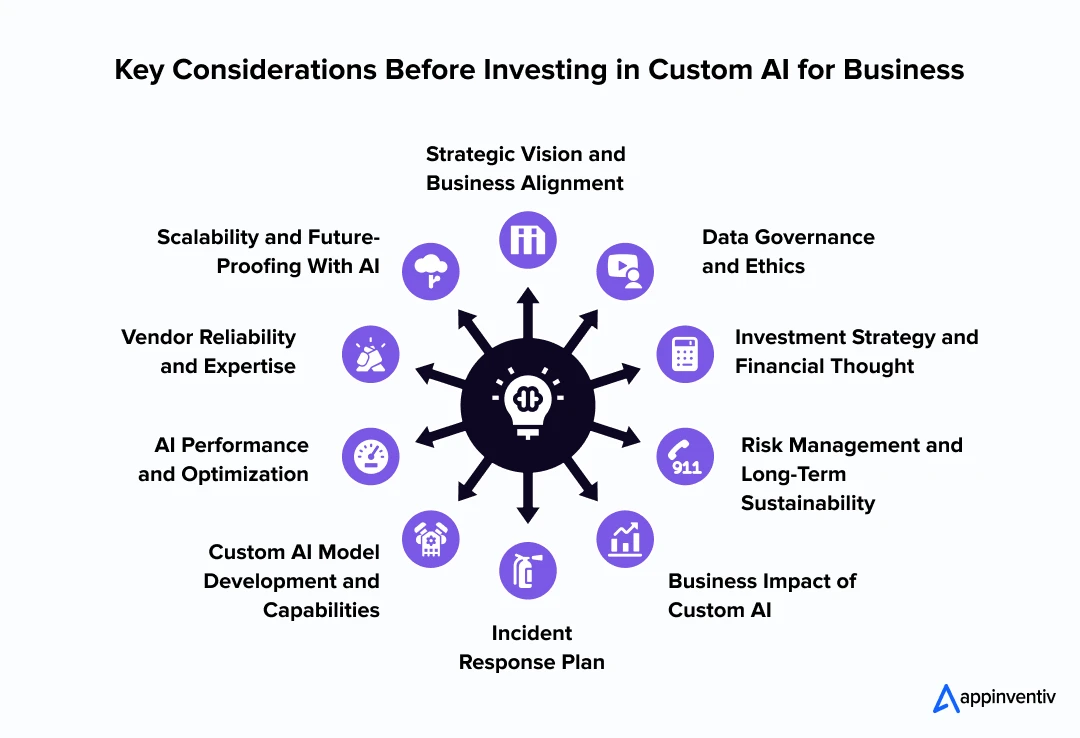
Ecosystem and Technology Infrastructure Readiness
Still, the stakes are high. With 92% of global enterprises increasing AI investment, the pressure to build fast is real, but so are the risks. From data privacy concerns to model explainability, the wrong approach can stall innovation instead of accelerating it.
That’s where custom AI changes the game—with governance, integration, and performance designed for your exact business environment.
But success doesn’t start with code. It begins with clarity.
Before you invest in custom AI, here are the essential questions to ask your prospective technology partner—questions that separate tactical vendors from strategic allies.
Strategic Vision and Business Alignment
Custom AI for business is a strategic lever to pull your company ahead. These questions ensure your investment delivers the real business impact of custom AI globally.
What business outcomes do we want to achieve with AI?
Domain-specific AI solutions address a particular pain point, such as improving customer experience, optimizing the supply chain, or refining decisions. A retail brand can provide personalized eCommerce solutions with the use of AI, and a logistics company can optimize global shipping routes.
Custom solutions are the star in this realm, crafted to uniquely serve you. And in places where off-the-shelf solutions fail, custom solutions can produce a proven victory. Therefore, decide on a particular goal you want to achieve with custom AI solutions.
How does AI fit into our long-term business strategy?
Your AI must evolve with your goals, not sit as a one-off project. A strategic partner focuses on the scalability of AI solutions, whether you’re entering new markets or aiming to improve efficiency.
For instance, DHL, a global logistics provider, integrated AI into their supply chain operations, aligning with their business goal to optimize delivery routes.
What unique competitive advantage can AI provide?
Custom AI goes beyond automation—it enables your business to solve domain-specific challenges faster, smarter, and at scale. Whether it’s reducing churn for a SaaS product through predictive modeling or optimizing pricing across thousands of SKUs for a global retailer, tailored AI models can uncover insights that generic solutions miss.
If your AI delivers outcomes your competitors can’t replicate, it’s no longer just a tool—it’s your moat.
What can we do about making our AI solution capable of adjusting to the changes in the market?
In fast-moving markets, yesterday’s data can’t power tomorrow’s decisions. Custom AI solutions should be built on modular, retrainable architectures that can ingest new data, retrain models, and evolve as customer behavior or market dynamics shift. Ask your provider how often the model can be updated and what systems are in place for continuous learning.
Ecosystem and Technology Infrastructure Readiness
A solid foundation is essential for survival in the competitive AI market. These questions will ensure that your tech stack is prepared and your AI strategy for businesses aligns.
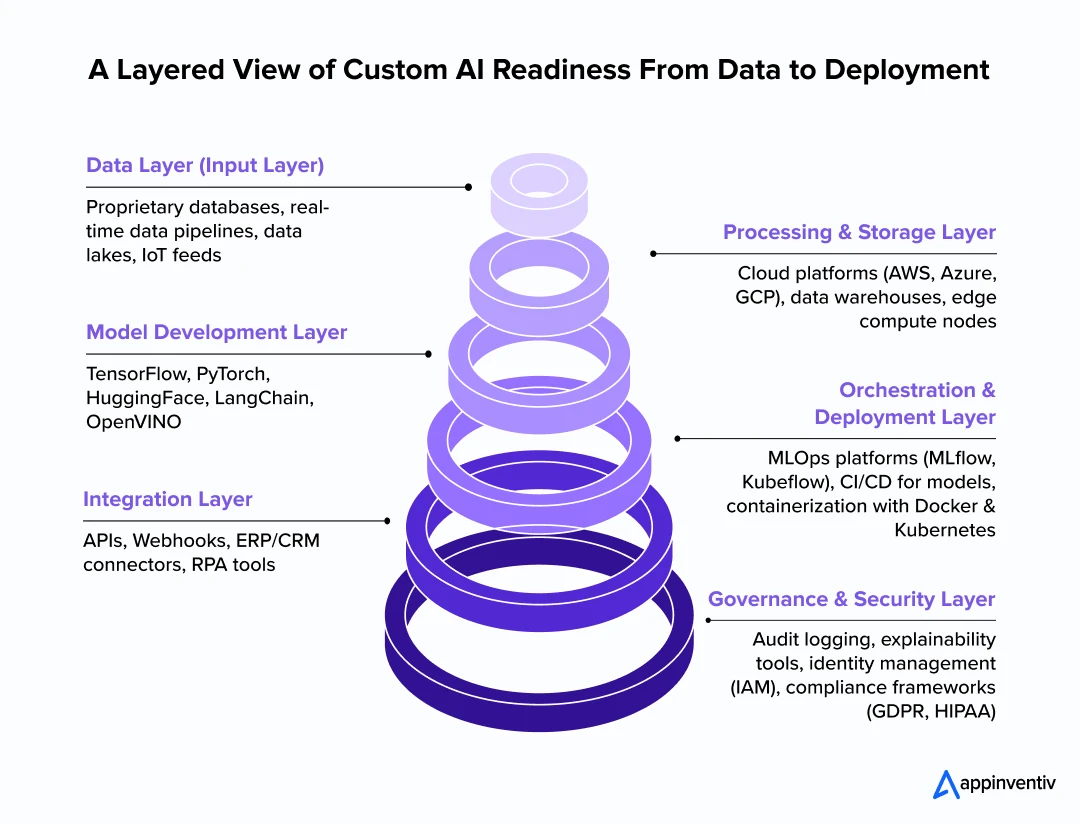
- How well-equipped is our current technology stack for AI integration?
Successful AI implementation isn’t just about the model—it’s about how well it fits into your existing infrastructure. Your databases, APIs, cloud platforms, and legacy systems must support scalable AI workflows. A custom AI solution should integrate seamlessly with your tech stack, ensuring data continuity and minimal disruption.
For example, an eCommerce company using Shopify and AWS might require custom pipelines for AI-driven inventory analytics. Choose a partner that conducts a deep tech-stack audit and builds integration first—because even the smartest AI fails when it operates in a silo.
- What tools and technologies will we need to build and deploy AI?
AI implementation considerations go far beyond just choosing a framework—they include the right mix of machine learning libraries, infrastructure, and deployment environments that align with your use case and scale. Whether you’re deploying a computer vision model using TensorFlow, a conversational AI with Rasa, or a predictive engine on AWS SageMaker, the key is customizing the stack to match your goals.
Ask your AI partner how they evaluate AI tech stack compatibility and which tools they recommend because the right choices here set the foundation for performance, scalability, and ROI.
- How will AI integrate with our other business systems (CRM, ERP, etc.)?
Whether it’s embedding AI insights into your CRM (like Salesforce or HubSpot) for smarter lead scoring or connecting with your ERP to forecast inventory demands, the power lies in seamless alignment.
Ask your development partner how they plan to integrate AI with your existing systems and what interoperability frameworks they’ll use because, without smart integration, even the best models won’t drive real results.
- What are the computational and resource requirements for deploying custom AI models (LLMs)?
Custom AI—especially large language models (LLMs)—requires significant computing power, often involving GPU clusters, scalable cloud environments, and high-throughput storage. These requirements can vary dramatically based on model complexity, use cases, and user load.
Ask your AI vendor for a detailed infrastructure assessment. They should outline both current capacity gaps and the projected resource roadmap so you can scale without hitting performance bottlenecks or hidden costs.
Data Governance and Ethics
Custom AI doesn’t just need data—it needs the right data handled the right way. As privacy regulations tighten and trust becomes a competitive currency, asking the tough questions now ensures your AI is not only smart but secure, ethical, and regulation-ready from the start.
- How do we ensure ethical AI development and usage?
Ethical AI in business isn’t just a guideline—it’s a brand safeguard. With custom AI, you can embed fairness, transparency, and accountability from day one. Ask how your partner validates model behavior and aligns development with global ethical standards.
- What are we going to do for the AI security and privacy of data?
In an AI-first world, privacy isn’t a compliance checkbox—it’s a competitive edge. From GDPR to regional mandates, your AI solution must be secure by design. Whether it’s encrypted customer data in FinTech or sensitive health records in MedTech, ask your vendor how security is architected into every layer—from data pipelines to model outputs—because trust begins with protection.
- How will we identify and mitigate biases in our AI models?
Bias can hide in training data and algorithms alike. Custom AI allows granular audits using fairness metrics and diverse datasets. Ensure your vendor has a structured bias detection framework and the tools to retrain or recalibrate models as needed.
- How do you ensure data ownership and intellectual property protections?
With Custom AI, clarity around data and IP isn’t optional—it’s foundational. You should retain full ownership of your raw data, the trained models derived from it, and any proprietary algorithms developed. Ask your vendor to explicitly outline:
- Who owns the model weights and outputs
- How third-party APIs (if used) affect ownership
- How your data is isolated and not reused across clients
A reliable partner will ensure all rights—data, model, and IP—stay with you, backed by clear SLAs and compliance documentation.
Investment Strategy and Financial Thought
Custom AI delivers long-term value—but only when aligned with the right financial lens. These questions help you evaluate the total cost of ownership, potential ROI, and how custom AI fits into your broader digital investment roadmap.
- What are the key cost components involved in developing and maintaining a custom AI solution for my business?
Custom AI solutions for businesses involve costs across data preparation, infrastructure, model development, and continuous optimization—but they’re built to serve high-value use cases that generic tools can’t. Whether you’re automating claims processing or deploying predictive analytics, each cost component directly maps to a measurable business goal, making the investment far more strategic than one-size-fits-all solutions.
- What is the pricing model that your company offers to develop custom AI solutions (e.g., fixed price, time & materials)?
For predictable AI projects—like defined automation tools or internal chatbots—vendors may offer a fixed-price model. For more iterative, R&D-heavy builds, like LLM-powered decision engines or evolving recommendation systems, a time-and-materials model is standard.
Ask your provider to clearly break down development, training, and post-deployment support costs to ensure transparency and better control over your AI for business investment.
- Which ROI and KPIs are projected in terms of AI adoption?
The ROI of custom AI becomes tangible when mapped to targeted business outcomes, like reducing churn, automating claims, or optimizing supply chains. For measuring AI success, define performance indicators upfront, such as operational cost savings, speed-to-decision, or customer lifetime value. The more aligned your KPIs are with your business goals, the clearer your AI’s impact becomes, especially at scale.
- What is the long-term financial commitment required for AI implementation?
AI isn’t a one-time investment—it evolves. Custom AI offers greater predictability by aligning long-term costs with your specific use case. From model retraining and infrastructure scaling to performance monitoring and regulatory updates, each phase requires foresight.
Ask your vendor for a detailed financial roadmap covering upkeep, re-optimization, and expansion so your investment remains strategic, not reactive.
- How transparent is the pricing model for custom AI development?
Hidden costs can derail AI for business investment. Demand a clear pricing model covering development, maintenance, and scaling, ensuring costs align with your global goals.
Also read: How Much Does It Cost to Build an AI Product?
Risk Management and Long-Term Sustainability
As models evolve and regulations shift, the real risk lies in deploying AI without long-term governance. From vendor lock-in to performance decay, these challenges scale with your business.
Ask how your partner plans for retraining cycles, infrastructure flexibility, and regulatory resilience—because sustainable AI isn’t optional, it’s the foundation for staying competitive.
- What potential risks are involved in adopting AI?
From model drift to compliance failures, AI risks go beyond flawed predictions—they can damage trust and bleed resources. Custom AI minimizes this with domain-specific validation, governance layers, and agile retraining. Ask your vendor how they design around risk because in high-stakes environments, resilience is ROI.
- How will we monitor and adjust AI performance over time?
Your AI solutions need constant tuning to adapt to your growing business. Custom solutions enable real-time monitoring, like tracking a global eCommerce AI’s recommendation accuracy. Ask for tools and processes to keep performance aligned with your goals.
- What is the plan for maintaining AI models and ensuring their relevance?
Custom AI requires continuous optimization. As business dynamics shift, so must your models—through retraining, drift detection, and usage-based fine-tuning. Ask your partner how they ensure long-term performance without compromising speed or accuracy.
Deploy enterprise-ready AI solutions tailored to your ecosystem and growth goals.
Business Impact of Custom AI
Custom AI for business growth isn’t merely a system upgrade—it’s the accelerating engine. From driving faster decisions to reshaping customer experiences, these questions help you measure how AI will deliver tangible, business-critical outcomes across your operations.
- How will AI impact our employees and organizational culture?
AI reshapes work—not by replacing teams but by augmenting their capabilities. Custom AI fits your company’s DNA, boosting productivity and decision-making. The real challenge? Change management. Ask your vendor how they enable smooth adoption through targeted training and ongoing support to turn AI from a tool into a growth driver.
- How will AI improve customer experience and service delivery?
Custom AI models transform customer touchpoints, like a chatbot that feels more human than your last support call. Tailored solutions deliver precise experiences, like personalized offers for global e-commerce, boosting satisfaction. Ask how AI will elevate your CX game.
- How will we measure the success and ROI of custom AI adoption?
Success means measurable impact. Define clear KPIs upfront:
- Revenue Growth
- Cost savings
- Reduced Churn
- Faster Processing Times
Drill into metrics that matter for your business and industry. Demand regular, transparent reporting from your vendor that links AI outcomes directly to these goals. That’s how you keep your investment accountable and ensure your AI delivers real, scalable value.
- What is the expected ROI timeline for AI adoption?
ROI timelines vary based on AI implementation considerations and project complexity. A chatbot might drive impact within months, while advanced predictive analytics requires more runway. Custom AI sets clear, goal-aligned milestones—ask your vendor for a transparent roadmap so you can track when value starts flowing.
Incident Response Plan
AI systems can face unexpected issues. Therefore, planning for glitches and setbacks is essential. These questions help you ensure your partner has a clear, proactive strategy to detect, manage, and resolve AI incidents swiftly, keeping your operations smooth and secure worldwide.
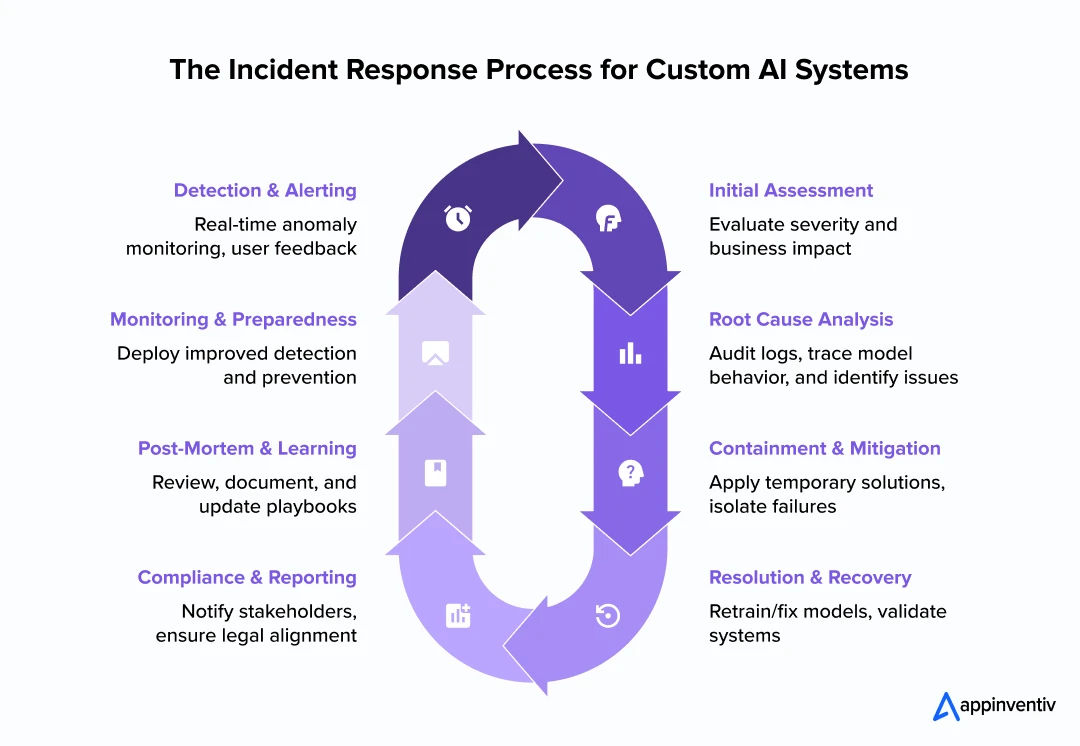
- What will our communication protocol be during a model-related incident?
Transparency is key if an AI misfires. Define how your vendor will communicate with global teams and customers, such as a protocol for a chatbot giving wrong answers. Ensure stakeholders stay informed.
- How will we assess the root cause of AI failures or inaccuracies?
Custom AI requires more than just performance monitoring—it demands traceability. Whether it’s a dip in model accuracy or a misclassification, your vendor should have clear diagnostics in place.
That includes versioned datasets, explainability layers, and real-time model observability to pinpoint whether the issue stems from data drift, integration gaps, or logic flaws. Because reliable AI isn’t just built—it’s continuously understood.
- How will we ensure compliance with legal and regulatory requirements when responding to AI incidents?
AI failures trigger more than operational risk—they activate legal responsibility. Whether you operate under GDPR or HIPAA, the incident response must be built for compliance from the start. Ensure your vendor’s response plan aligns with regulations, with clear steps to address breaches or errors.
Also read: AI Regulation and Compliance in the US
Custom AI Model Development and Capabilities
Custom AI models are your edge—ensure they’re built right. These questions dig into development.
- How do you tailor AI models to our specific business needs?
Custom AI should mirror your business logic, not override it. That means building models around your data, workflows, and outcomes—not generic use cases. Whether it’s automating claims processing or refining real-time recommendations, the goal is precision at scale.
Ask your vendor how they translate business priorities into model architecture—and how they validate that every layer of the AI delivers measurable impact aligned with your competitive advantage.
- What is the process for training custom AI models with our proprietary data?
Your data is your superpower when it comes to accurate AI model implementation. Ask how your vendor uses it to train AI, ensuring it reflects your global context, like training a retail AI on sales data for accuracy.
- What is the AI strategy for businesses addressing edge cases or uncommon scenarios within the AI model?
Edge cases aren’t just exceptions—they’re where generic AI breaks and custom AI proves its value. From rare customer behaviors to niche regulatory constraints, these scenarios can define product trust and market success.
Ask how your vendor identifies, tests, and resolves for outliers—whether through synthetic data generation, reinforcement learning, or human-in-the-loop systems. In high-stakes industries, edge case readiness isn’t optional—it’s foundational.
AI Performance and Optimization
Your AI must perform and improve. These questions ensure it stays sharp globally.
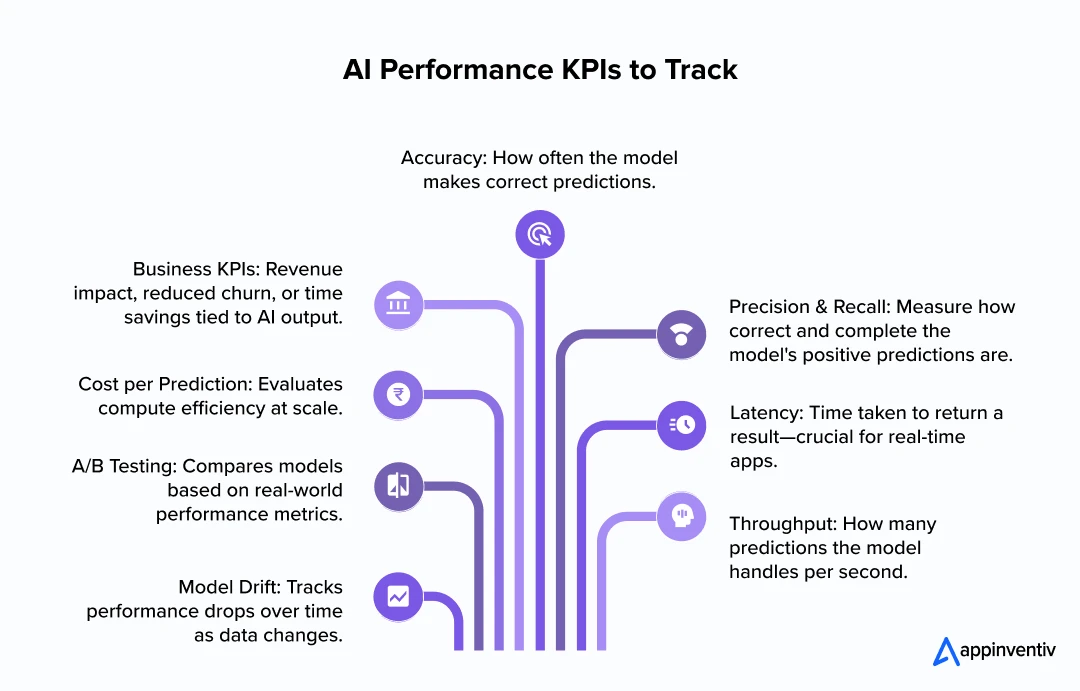
- How do you evaluate and benchmark the performance of custom AI models?
Performance is only real when it delivers impact.
Ask how your vendor benchmarks precision, latency, and real-world KPIs—like recommendation uptake or churn reduction—under production conditions. Because in custom AI, performance isn’t a number—it’s your advantage.
- How do you ensure the custom AI model is scalable for future growth?
Your custom AI model should be built on a modular architecture, containerized for flexible deployment, and cloud-optimized to handle increasing workloads without friction. Whether your business expands across new markets or data volumes surge, the model must grow with you.
Ask your vendor how they design for distributed training, multi-cloud environments, and incremental retraining—because growth shouldn’t break your system, it should be built into it.
- What is your approach to the continuous optimization of custom AI models post-deployment?
Without active refinement, even the most accurate AI system can fall behind. That’s why optimization isn’t optional. It’s engineered into the lifecycle.
Ask how your partner enables continuous learning loops—whether through performance monitoring dashboards, automated retraining pipelines, or human-in-the-loop review. In a dynamic environment, your AI must evolve with your users, your data, and your market. Anything less is technical debt waiting to happen.
Vendor Reliability and Expertise
In custom AI, execution is everything. These questions help you separate vendors who build real outcomes from those who just build code.
- What is your track record with building and deploying custom AI solutions in our industry?
Not all AI vendors are created equal. You need a partner who’s been in the trenches of your domain, solving real-world problems at scale. Ask for proof of experience — not just in building models, but in deploying solutions that drive measurable impact in your vertical.
Whether it’s patient risk profiling in healthcare or churn prediction in fintech, industry context isn’t optional — it’s the blueprint for success.
- What is the expertise and experience of your AI engineers in developing custom solutions?
You need AI developers who’ve built, scaled, and optimized models for your kind of data, complexity, and industry. Ask for proof—what kind of models have they shipped? How do they handle real-world constraints like compliance, latency, or multilingual datasets? Because your AI is only as sharp as the minds behind it.
- How do you ensure transparency throughout the development process of custom AI solutions?
Your partner should offer visibility at every phase: from data sourcing and labeling to model decisions and deployment logic. Ask how they document workflows, provide access to testing environments, and structure checkpoints for stakeholder review because real impact demands real transparency—across teams, time zones, and decision layers.
Scalability and Future-Proofing With AI
Your strategy shouldn’t just solve today’s problems—it should be architected for tomorrow’s complexity. These questions are designed to stress-test whether your custom AI solution can evolve with market shifts, data surges, and new use cases—without breaking the pipeline or burning through resources.
- How scalable is the custom AI model?
Implementing custom AI for business growth requires handling large data volume, user load, and functional complexity—without trade-offs in performance. Ask your vendor how the system is architected to grow with your business, not around it.
- How future-proof is the AI solution you are providing?
Tech evolves fast—your AI must keep up. Custom solutions integrate with emerging tech like 5G or IoT. Ask how your vendor ensures long-term relevance.
- What steps do you take to ensure compatibility with future technologies (e.g., 5G, IoT)?
Your AI should sync with tomorrow’s tech. From IoT-driven automation to edge-ready inference for 5G environments, compatibility is a strategy, not a feature. Ask how your AI will integrate with next-gen technologies without rewrites or retrofits.
Why Choose Appinventiv for Custom AI Solutions?
Custom AI requires a precise execution that drives market advantage and redefines your business’s future. Therefore, choose the right partner that crafts a growth engine to power your vision, delivering impactful results, whether it’s automating workflows or creating enterprise-grade custom AI models that meet business goals.
Appinventiv is your strategic partner for custom AI services, transforming visions into market-defining solutions. With over 3,000 projects across 35+ industries, our 1,600+ tech experts deliver smart solutions focusing on the scalability of AI solutions for businesses that drive efficiency and growth. Our tailored approach ensures AI models align with your goals—whether automating workflows, boosting customer retention, or smart crafting chatbots that scale without breaking budgets.
Take our work with a leading European bank struggling with customer churn, inefficient ATM operations, and rising support costs. We delivered a suite of AI-driven solutions—from a conversational AI that now resolves over 50% of service queries to a predictive churn model that flagged 40% of at-risk home loan customers, resulting in a 20% boost in retention.
We didn’t just automate workflows—we amplified outcomes:
- 92% improvement in ATM service levels through cash demand forecasting
- 35% reduction in manual processes with AI-led automation
- 50% improvement in accuracy across core banking ops
- And 20% savings in manpower costs with conversational AI at scale
This is custom AI delivering on its promise: clarity, speed, and competitive impact—right where your business needs it most.
Ready to transform your most critical workflows? Tell us where your process needs rethinking, and we’ll deliver an intelligent solution strategically designed for performance, precision, and measurable outcomes. Contact Appinventiv to build the AI system your business needs now.
FAQs
Q. How can AI help small businesses?
A. AI technology ensures small businesses play on an even field by automating tasks, such as customer support or demand forecasting. Even small businesses can benefit from AI by deploying cost-effective chatbots or demand forecasting tools tailored to their specific workflows. These solutions are cost-effective, so they are growing and creating loyalty.
Every new technology will have some learning process to get the benefits, and the vendor may provide support on how to onboard and train, so make sure to ask the right questions before investing in custom AI for small businesses so it is actually effective.
Q. What are the key factors to consider before investing in custom AI for your business?
A. Consider the technological preparedness, data ethics, cost-effectiveness, and AI strategy for businesses before you immerse in this technology integration. Make sure your AI is compatible with other systems, such as CRM, and complies with regulations such as GDPR.
Evaluate vendor skills and scalability to maximize the business impact of custom AI. The strategy should ensure that custom AI for business fits your purposes and adjusts to the changes in the global market to follow long-term success.
Q. How can custom AI benefit my business in terms of efficiency and growth?
A. Personalized AI makes everything more efficient, such as automating operations or being customized with eCommerce, and also drives growth by enhancing retention. A startup may gain an increment on targeted suggestions. Custom AI for business will increase the accuracy of decisions, giving local stores and multinationals a competitive edge that is measurable.
Q. What is the average cost of developing a custom AI solution for a business?
A. Tailored AI costs can be as low as $20,000-$100,000 for basic tools such as chatbots to as high as $100,000-$500,000+ on complex systems such as predictive analytics. Investing in custom AI includes considering maintenance, development, and training costs. Request vendors to quote as per your objectives and ask them to be clear on any hidden costs.
Q. What role does AI play in business decision-making?
A. With the help of AI, data-driven information is transforming the way decisions are made, utilizing past trends in customer behavior or other market aspects to predict outcomes. A fintech firm might use AI to assess risks in real-time while retailers optimize pricing.
Customized solutions will ensure that AI in business decision-making can make decisions faster and more sharply to achieve global success without missing a beat.


Ask the right questions!
- In just 2 mins you will get a response
- Your idea is 100% protected by our Non Disclosure Agreement.
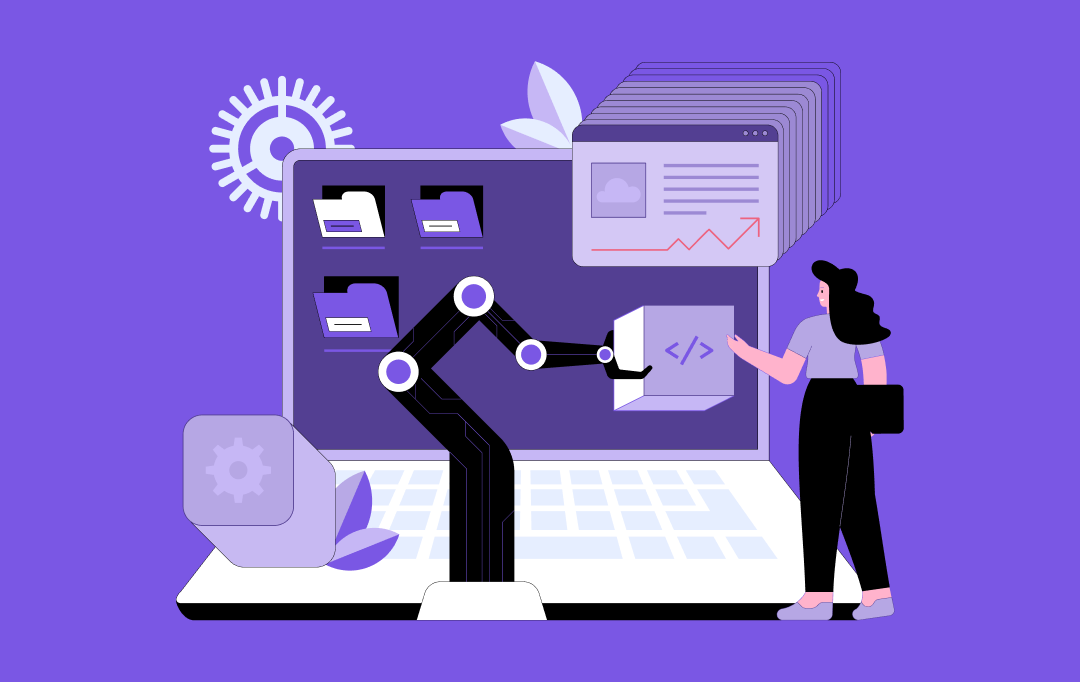
Integrating AI into ERP Systems - Benefits, Process, and Costs
Key takeaways: Market Growth: The global AI in ERP market is projected to reach USD 46.5 billion by 2033, highlighting its rapid growth trajectory. Automation: AI automates tasks like invoice processing and inventory management, cutting costs by up to 25% using RPA and OCR. Use Cases: AI enhances ERP systems with capabilities such as demand forecasting, predictive maintenance,…

How Agentic AI is Addressing Enterprise Challenges and Driving Business Growth in Australia
Key takeaways: Agentic AI drives business growth by automating tasks, improving efficiency, and making independent decisions. Australian enterprises benefit from AI in overcoming data integration challenges, enhancing productivity, and optimizing cybersecurity. Industries such as Healthcare, Retail, and Finance are experiencing tangible improvements in customer experience and operational efficiency thanks to Agentic AI. Scalability and cost…

How to Integrate AI with EHR/EMR Systems for Streamlined Healthcare Operations
Key takeaways: Not adopting AI in EHR/EMR today risks falling behind. AI streamlines EHR workflows, cutting clinical and admin delays. Real-world hospitals are already seeing faster, smarter care with AI. Seamless AI integration needs system checks, data prep, and training. AI in EHR tackles real challenges like bias, cost, and compliance. Custom AI integration costs…






